10 Best LLM Programs In The U.S
10 best LLM programs in the U.S., including prestigious institutions like New York University School of Law, University of Chicago Law School, Duke University School of Law, and Columbia University Law School, are known for offering comprehensive education, global recognition, and unmatched networking opportunities. The best LLM programs in the U.S. provide a comprehensive education, global recognition, and unparalleled networking opportunities. The programs attract legal scholars from diverse backgrounds worldwide, offering specialized courses and research opportunities. Prestigious institutions ensure that students receive academic training and practical exposure through internships, externships, and clinics.
The top LLM programs in U.S. are highly regarded for their academic rigor and faculty expertise. Each institution offers unique concentrations, allowing students to tailor their education to align with career goals. Several programs focus on areas like corporate law, intellectual property, and international law. The faculty at the institutions includes renowned legal experts and practitioners who provide valuable insights and mentorship. The best LLM programs ensure graduates leave with the knowledge, experience, and connections needed for success. Graduates of the best LLM programs benefit from a strong alumni network and global opportunities. The top LLM program has relationships with law firms, corporations, and governmental bodies, ensuring students access to career placement services and professional development resources. The programs emphasize interdisciplinary learning, encouraging students to engage with other fields such as business, public policy, and international relations.
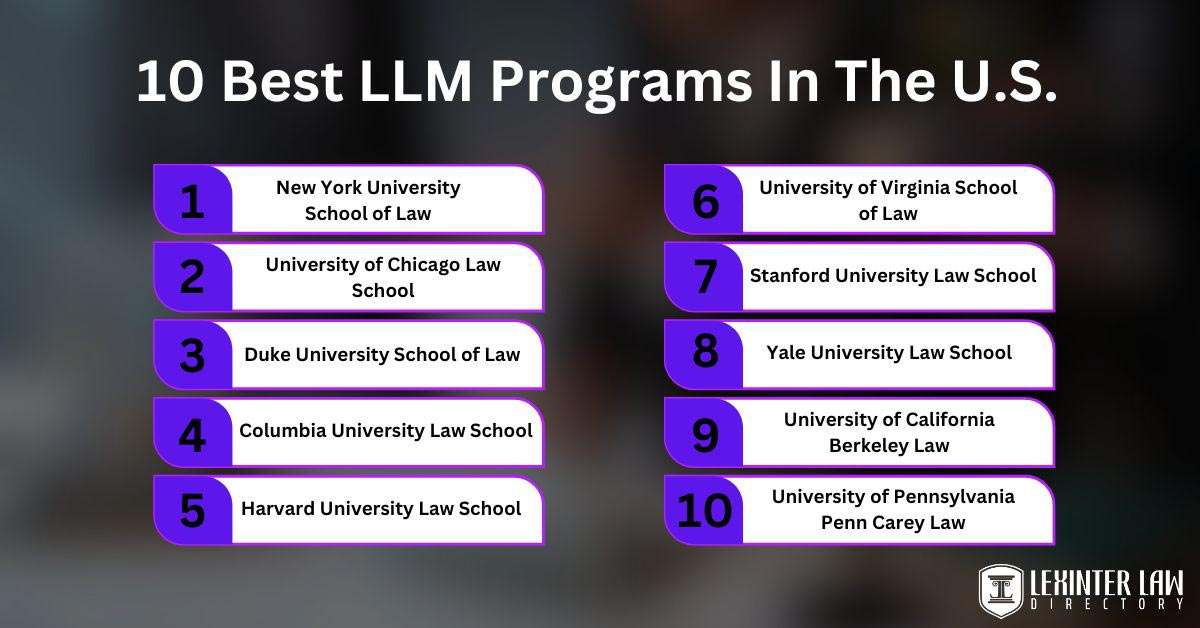
The 10 best LLM programs in the U.S. are listed below.
- New York University School of Law: New York University School of Law offers a globally renowned LL.M. program with specializations such as international law and taxation established in 1835. Students benefit from a vibrant legal market and numerous career opportunities located in New York City. NYU Law is consistently ranked as one of the top choices for individuals pursuing advanced legal education in the United States.
- University of Chicago Law School: The University of Chicago Law School is known for its emphasis on interdisciplinary legal education, particularly in law and economics, and was established in 1902. The LL.M. program focuses on analytical thinking and preparing students for global legal challenges. The school offers a dynamic legal environment located in Chicago. The University of Chicago is consistently ranked among the top law schools worldwide.
- Duke University School of Law: Duke University School of Law offers a comprehensive LL.M. program with specializations in areas such as business law and international human rights, established in 1868. The program balances practical legal training with rigorous theoretical foundations. Duke Law provides a supportive academic environment located in Durham, North Carolina. The university ranks among the leading law schools in the United States.
- Columbia University Law School: Columbia University Law School offers a prestigious LL.M. program with specializations in corporate law, international arbitration, and human rights, established in 1858. The school is located in New York City and provides access to a vast legal market. Columbia Law students engage with distinguished faculty and extensive networking opportunities. Columbia Law ranks among the most prestigious institutions globally.
- Harvard University Law School: Harvard University Law School offers one of the best LL.M. programs in the US, with a wide array of legal disciplines established in 1817. The program allows students to engage with globally recognized faculty and participate in legal clinics. Harvard Law offers unparalleled networking opportunities and continues to rank as one of the top institutions worldwide, located in Cambridge, Massachusetts.
- University of Virginia School of Law: The University of Virginia School of Law offers an LL.M. program focusing on business law, international law, and human rights, established in 1819. The program fosters a supportive community and emphasizes practical legal training. UVA Law consistently ranks among the top law schools in the United States, providing students with a serene academic environment located in Charlottesville, Virginia.
- Stanford University Law School: Stanford University Law School offers an LL.M. program specializing in legal technology, international law, and corporate governance, established in 1893. The program provides access to Silicon Valley’s dynamic legal and business environments. Stanford Law offers students cutting-edge resources and expert faculty located in California. Stanford consistently ranks as one of the top law schools globally.
- Yale University Law School: Yale University Law School offers a prestigious LL.M. program known for intellectual rigor and strong faculty-student collaboration established in 1824. The program encourages independent research and theoretical exploration. Yale Law, located in New Haven, Connecticut, provides a close-knit academic environment. The school is consistently ranked as one of the top law schools globally, attracting students interested in academic and public interest law.
- University of California Berkeley Law: University of California Berkeley Law offers an LL.M. program with an emphasis on intellectual property law, environmental law, and international business law, established in 1894. The program offers a dynamic learning environment with access to top professionals. Berkeley Law provides students with numerous opportunities in the technology and corporate sectors located near Silicon Valley. Berkeley Law consistently ranks among the top law schools worldwide.
- University of Pennsylvania Penn Carey Law: The University of Pennsylvania Penn Carey Law offers a highly regarded LL.M. program specializing in business law, public interest law, and international law, established in 1850. The program emphasizes interdisciplinary learning and global legal careers. Penn Law offers access to a vibrant legal market and a strong alumni network located in Philadelphia. Penn Carey Law remains a top-ranked institution globally.
Table of Contents
- 1. New York University School Of Law
- 2. University Of Chicago Law School
- 3. Duke University School Of Law
- 4. Columbia University Law School
- 5. Harvard University Law School
- 6. University Of Virginia School Of Law
- 7. Stanford University Law School
- 8. Yale University Law School
- 9. University Of California Berkeley Law
- 10. University Of Pennsylvania Penn Carey Law
- How To Choose A Law School For LLM Degree?
- What Are The Best LLM Specializations?
- How Can Lexinter Help You Find A Nearby Attorney?
1. New York University School Of Law
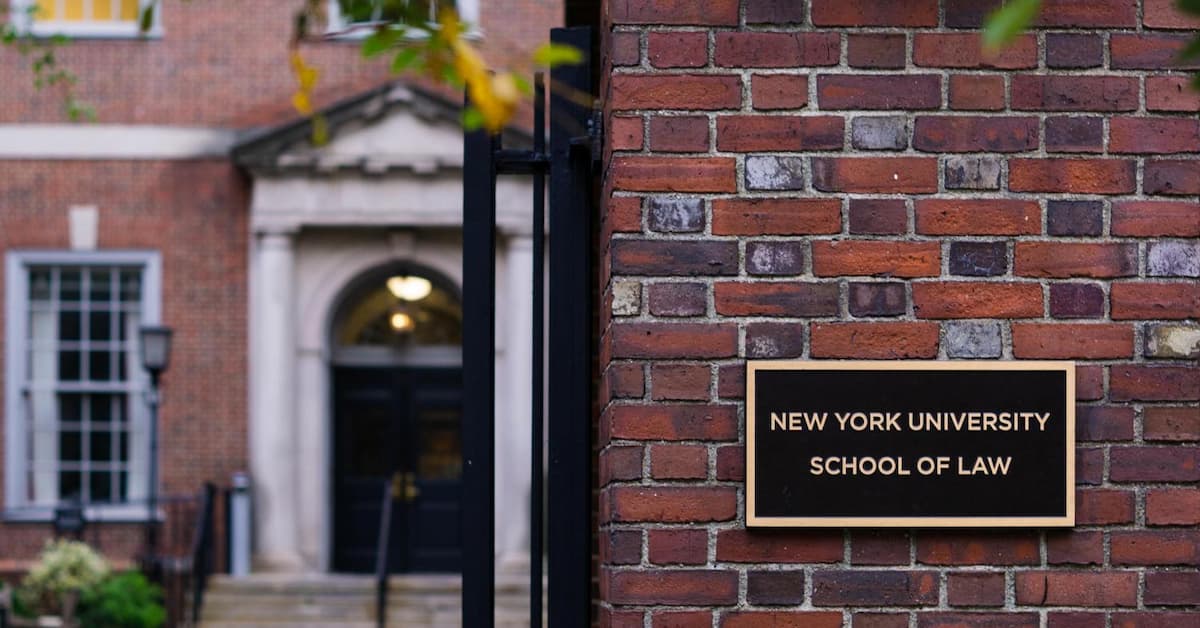
New York University School of Law (NYU Law) is one of the most prestigious legal institutions in the world. NYU Law is the oldest law school in New York City and has a global reputation for excellence. The law school was founded in 1835. The school is known for offering diverse and innovative legal programs, preparing students for careers in various fields, including corporate law, intellectual property, environmental law, and more. NYU Law stands out for its academic rigor and commitment to producing leaders in the legal profession. NYU Law consistently ranks among the top law schools globally, with a selective admissions process that admits only a fraction of applicants. The curriculum provides an extensive range of electives, including strong programs in tax law, international law, and clinical education. The faculty includes leading legal scholars, creating a rich and intellectually stimulating environment. Scholarships like the prestigious Hauser Global Scholarship attract international students, further enhancing the school’s global academic reputation.
NYU Law is the oldest surviving law school in New York State, pioneering legal education for nearly two centuries. The law school was founded in 1835. The school was among the first to admit women, playing a progressive role in the legal profession. The school, located in Manhattan’s Greenwich Village at Washington Square, benefits from its proximity to the city’s financial, legal, and cultural institutions. The prime location offers students opportunities to engage with New York City’s legal community and gain practical experience. New York University School of Law has an acceptance rate of 16.76%, making the admission process highly competitive. Each year, approximately 8,500 applicants apply, with only about 1,424 being admitted. NYU Law’s rigorous selection process ensures the school attracts top legal talent worldwide. Applicants must demonstrate academic excellence, leadership qualities, and a commitment to the legal profession. The school’s selective nature contributes to its reputation as one of the top law schools in the country.
NYU Law boasts an impressive Bar exam passage rate, with 96.58% of its graduates passing the Bar in 2023 on their first attempt. The rate significantly exceeds the average Bar passage rate for New York law schools, which is approximately 81%. Graduates benefit from NYU Law’s strong academic preparation, practical training, and extensive resources. The high Bar passage rate reflects the school’s commitment to producing competent and well-prepared legal professionals ready to excel in their careers. NYU Law offers a wide range of LLM specializations designed to provide students with advanced legal knowledge. Specializations include Corporate Law, International Legal Studies, Taxation, Environmental and Energy Law, and Legal Theory. The program includes niche fields like Competition, Innovation, Information Law, Constitutional Law, and Civil Liberties. Students are prepared for global legal careers through a comprehensive curriculum and specialized training in their chosen field. NYU Law’s LLM programs attract students seeking expertise in specific areas of law.
The tuition for NYU Law’s 2023-2024 academic year stands at $80,014, reflecting the cost of top-tier legal education. The total annual cost of attendance, including living expenses like room, board, books, and personal costs, is about $109,458. NYU Law offers substantial financial aid, including grants and scholarships, to help offset the high costs. Several students receive financial assistance to make the prestigious education more affordable. The school’s financial aid resources help alleviate the burden for students.
2. University Of Chicago Law School

The University of Chicago Law School, founded in 1902, is a premier institution known for its interdisciplinary approach and rigorous academic standards. The school prepares students for careers in academia, law firms, government, and business, offering JD, LLM, JSD, and MLS programs. The school is renowned for blending legal studies with economics, philosophy, and social sciences, producing graduates equipped with diverse intellectual tools to navigate complex legal challenges in a globalized world. UChicago Law pioneered the JD degree and remains a leader in the development of fields like law and economics. The school is distinguished by small class sizes, an esteemed faculty, and high employment outcomes for graduates. Students benefit from an environment that encourages intellectual inquiry and debate across various legal disciplines. The school’s interdisciplinary curriculum prepares students for diverse legal roles, ensuring they gain a well-rounded, comprehensive education in law, social sciences, and philosophy.
The University of Chicago Law School was part of the university’s broader academic mission to provide rigorous training, established in 1902. The law school played a pivotal role in advancing legal education by introducing courses like administrative law and comparative law. UChicago Law is housed in a modernist building designed by Eero Saarinen located in the Hyde Park neighborhood on the university’s main campus. The school’s location provides access to Chicago’s legal community, fostering professional opportunities for students. The University of Chicago Law School has an acceptance rate of 12.78%, making it highly selective. The 2023 admissions cycle saw more than 5,200 students apply, with only 747 being admitted. The competitive nature of the admissions process reflects the school’s commitment to academic excellence. Students who gain admission demonstrate strong academic backgrounds, leadership potential, and a dedication to the legal profession. The school’s rigorous selection process helps maintain its reputation as one of the nation’s top law schools.
The University of Chicago Law School’s Bar exam passage rate is remarkably high, with 97.10% of graduates passing on their first attempt in 2023. The rate is significantly higher than the national average of 77% and Illinois’ state average of around 78%. The school’s rigorous academic preparation and practical training contribute to its graduates’ success. UChicago Law provides the resources and support necessary for students to excel in their Bar exam and subsequent legal careers. The University of Chicago Law School offers a flexible and interdisciplinary general LLM program, allowing students to tailor their studies. The curriculum covers various topics, including corporate law, international law, and public law. The program’s flexibility enables students to pursue specialized interests while benefiting from the law school’s broader intellectual environment. The small, diverse cohort fosters a close-knit community, providing students with collaborative learning opportunities and building strong professional relationships.
Tuition at the University of Chicago Law School is $77,877 for the 2023-2024 academic year. The total cost of attendance exceeds $100,000 annually, including room, board, and personal expenses. The law school offers financial aid options to help students manage expenses, even at high costs. Several students receive scholarships and grants, reducing the financial burden. The school’s financial aid resources help ensure talented students afford a top-tier legal education.
3. Duke University School Of Law

Duke University School of Law, established in 1868 as Trinity College School of Law, is a prestigious institution. Duke Law, recognized for its interdisciplinary approach and academic rigor, consistently ranks among the top law schools in the United States. The school offers JD, LLM, and SJD programs, producing legal professionals who demonstrate strong leadership, ethical standards, and a commitment to public service. Duke Law is part of Duke University’s broader academic community located in Durham, North Carolina. Duke Law has a highly selective admissions process, with an acceptance rate between 12% and 20%. The school emphasizes experiential learning, offering over 25 clinical programs and externships for hands-on legal experience. Graduates benefit from a 96% employment rate within ten months of graduation, with top private sector salaries around $180,000. Duke Law’s robust academic programs and practical learning opportunities equip students with the skills needed for successful legal careers. The school’s location offers access to a vibrant professional and cultural community.
Duke Law School began in 1868 as Trinity College School of Law, adopting its current name in 1924. The school has maintained a reputation for academic excellence, combining traditional legal principles with interdisciplinary approaches. Major expansions in the 1960s and renovations completed in 2008 enhanced the law school’s facilities. Duke Law, located in Durham, North Carolina, within the Research Triangle, benefits from a modern campus environment. The city’s rich cultural and professional scene offers students numerous personal and professional development opportunities. Duke University School of Law has an acceptance rate of 10.51% for the 2023-2024 academic year. The acceptance rate reflects the highly competitive nature of the admissions process, making Duke Law one of the most selective schools in the country. Applicants must demonstrate strong academic credentials, leadership abilities, and a passion for the legal profession. The rigorous standards maintain the school’s elite status and reputation in legal education.
Duke University School of Law boasts an impressive Bar exam passage rate of 94.44% in 2023. The figure significantly exceeds the national average of 77%, demonstrating the effectiveness of Duke Law’s academic preparation. The high passage rate reflects the support and resources provided to students throughout their legal education. Graduates benefit from comprehensive training that equips them to succeed in their legal and professional careers. Duke University School of Law offers a robust LLM program primarily designed for graduates of foreign law schools. The curriculum allows students to explore the U.S. legal system while specializing in areas such as Business Law, Human Rights, and Criminal Law. LLM students take courses from other departments at Duke University, such as the Fuqua School of Business, enriching their academic experience and professional skills.
Duke University School of Law tuition is $75,618 for the 2023-2024 academic year, a 4.28% increase. The total cost of attendance is estimated at $100,226 annually, including living expenses. The rising cost of legal education at Duke Law aligns with broader national trends. Duke Law offers financial aid options and scholarships, helping students manage the financial burden of a prestigious legal education, even with the cost.
4. Columbia University Law School
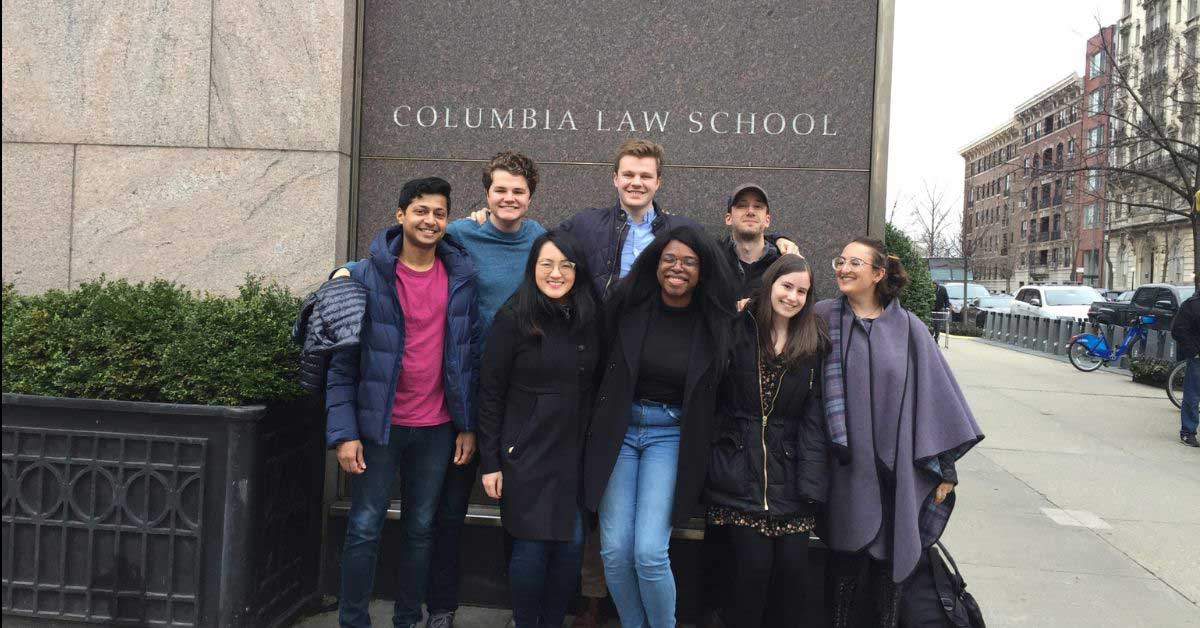
Columbia University Law School, founded in 1858, is one of the most prestigious law schools in the United States. The school offers a rigorous legal education with a global perspective, attracting students who aim to excel in law, government, and academia. Columbia Law has produced influential figures, including U.S. Presidents and Supreme Court justices, cementing its reputation as a leader in legal education and scholarship. Columbia Law consistently ranks among the top law schools globally and is known for its academic rigor and interdisciplinary programs. The school offers extensive international law opportunities, reflecting its commitment to a global legal perspective. Columbia Law’s location in New York City provides students unmatched access to internships, externships, and legal training. The renowned clinical program and mandatory pro bono requirement ensure students engage in public service during their studies, enhancing their practical experience.
Columbia Law School, founded in 1858, has been a pioneer in legal education, influencing areas like human rights and corporate law. The school’s early leadership in legal realism and intellectual property continues to shape its curriculum today. Columbia Law is part of Columbia University’s main campus located in Morningside Heights, Manhattan. The prime location offers students access to New York City’s legal, financial, and cultural institutions, providing abundant opportunities for professional growth and practical legal work. Columbia University Law School has an acceptance rate of 12.23% for the 2023-2024 academic year, reflecting its highly competitive admissions process. Applicants have strong academic credentials, including an average LSAT score of 173 and a GPA of 3.9. The selective nature of admissions ensures that Columbia Law attracts top-tier students from diverse backgrounds. Columbia Law remains one of the most sought-after law schools, maintaining rigorous academic and professional excellence standards.
Columbia University Law School achieved a Bar exam passage rate of 93.72% for 2023 graduates, significantly surpassing the New York State average of 81.24%. The high passage rate reflects the school’s rigorous academic curriculum and comprehensive support for students. The law school emphasizes preparation, providing extensive resources to ensure graduates excel in their Bar exams. Columbia Law’s commitment to academic excellence is evident in its graduates’ continued success in the legal profession. Columbia University Law School offers an LLM program allowing students to specialize in various fields, including Corporate Law, International Law, Human Rights, and Intellectual Property Law. The program is designed with flexibility, enabling students to deeply explore their chosen field or engage in multiple legal disciplines. Columbia Law’s LLM program attracts legal professionals from around the world, allowing them to enhance their knowledge and career prospects globally.
Columbia University Law School’s tuition is $81,292 for the 2023-2024 academic year. The total cost of attendance reaches approximately $113,711 annually, including living expenses, books, and personal costs. Columbia Law’s tuition reflects the high cost of legal education at a top-tier institution. Several students receive financial aid, grants, and scholarships to help manage their expenses, ensuring Columbia Law remains accessible to talented individuals from various financial backgrounds.
5. Harvard University Law School

Harvard University Law School, founded in 1817, is the oldest continuously operating law school in the United States. The school is renowned for its rigorous academic programs and global reputation in Cambridge, Massachusetts. Harvard Law School is considered one of the most prestigious law schools in the world. The law school has produced influential alumni, including U.S. Presidents, Supreme Court justices, and global leaders in law, government, and public policy. Harvard Law School offers various degree programs, including the JD, LLM, and SJD, and enrolls approximately 560 students per class. The school pioneered the “case method” of teaching, which has become a dominant model in legal education. Harvard Law offers extensive clinical programs, allowing students to gain hands-on legal experience in various fields. The highly selective admissions process attracts top-tier candidates, maintaining Harvard Law’s reputation for academic excellence.
Harvard Law School was founded in 1817, becoming a pioneer in legal education through its introduction of the case method under Dean Langdell in the late 19th century. The school’s history is marked by its significant influence on shaping American legal thought. The school occupies a campus of 19 buildings in Cambridge, Massachusetts, including Langdell Hall. The proximity to Boston allows students access to a vibrant legal community, fostering numerous professional and academic opportunities. Harvard University Law School has a highly competitive acceptance rate of 9.58% for the 2023-2024 admissions cycle. The applicant pool totaled nearly 8,334, with only 798 accepted, reflecting the school’s rigorous selection process. Successful applicants have strong academic credentials, with an average LSAT score of 174 and a GPA of 3.93. The selective admissions process ensures that Harvard Law attracts top candidates, maintaining its reputation as one of the world’s most prestigious law schools.
Harvard University Law School graduates achieved impressive results on the Bar exam, with a 96.1% passage rate in 2023. The figure significantly exceeds the state average for Massachusetts, underscoring the quality of academic preparation provided by Harvard Law. The school’s rigorous curriculum and extensive resources ensure that students are well-equipped to succeed in their legal careers. Graduates consistently perform at the highest level, academically and professionally. Harvard University Law School offers a flexible LLM program that allows students to specialize in various legal fields. Specializations include Corporate Law, International Law, Human Rights, and Constitutional Law. The program is designed to accommodate U.S. and international lawyers, offering a broad range of courses tailored to individual interests and career goals. The LLM program allows students to deepen their expertise and advance their legal careers globally.
Harvard University Law School’s tuition is $78,692 for the 2023-2024 academic year. The total cost of attendance reaches approximately $113,692 annually, including living expenses, books, and personal costs. The high cost is offset for many students through financial aid or scholarships, helping manage their expenses. Harvard Law’s financial aid resources make the prestigious legal education more accessible to talented students from various financial backgrounds, ensuring a diverse and qualified student body.
6. University Of Virginia School Of Law

The University of Virginia School of Law, founded by Thomas Jefferson in 1819, is one of the oldest law schools in the United States. The school is known for its academic rigor, prestigious faculty, and tradition of producing legal professionals who excel in public service and private practice. UVA Law remains a highly respected institution, offering students a strong legal principles and leadership foundation. The University of Virginia School of Law consistently ranks among the top law schools in the U.S. The school offers over 250 courses and seminars, 24 clinics, and numerous hands-on learning opportunities. UVA Law graduates experience high employment rates, with nearly 98% securing full-time positions within ten months of graduation. Several graduates move into large law firms or prestigious clerkships, reflecting the school’s strong professional connections and reputation.
The University of Virginia School of Law, established in 1819 as part of Thomas Jefferson’s vision for an “academical village,” has been a leading institution for over 200 years. The school was pivotal in shaping legal education by integrating practical training with academic learning. The law school is situated in Charlottesville, Virginia, on the University of Virginia’s scenic campus, a UNESCO World Heritage Site. The location provides students with a rich academic environment near Washington, D.C., offering unique opportunities for legal study and networking. The University of Virginia School of Law has an acceptance rate of 11.46% for the 2023-2024 academic year. The applicant pool consisted of 5,610 individuals, with only 643 accepted, reflecting the school’s competitive admissions process. Admitted students have strong academic credentials, with a median LSAT score of 171 and a median GPA of 3.94. The enrollment yield is 43.08%, highlighting UVA Law’s appeal to top-tier candidates.
The University of Virginia School of Law consistently achieves high Bar exam passage rates. UVA Law graduates achieved a first-time Bar passage rate of 96.5% in 2023, well above the state average. The success reflects the quality of education and comprehensive preparation provided by the school. UVA Law’s rigorous academic programs ensure that students are well-prepared to excel in their legal careers and pass the Bar exam. The University of Virginia School of Law offers a robust LLM program with various specializations. Students choose to focus on fields such as Business Law, Criminal Law, Human Rights, Constitutional Law, Environmental Law, and International Law. The program accommodates U.S. and international students, allowing them to tailor their coursework based on their career aspirations. The LLM program provides flexibility and depth in legal education.
Tuition at the University of Virginia School of Law for the 2024-2025 academic year is $74,700 for Virginia residents and $77,700 for non-residents. The total cost of attendance is approximately $105,870 annually, including living expenses, such as room, board, and personal costs. Several students receive financial aid or scholarships despite the high cost, making the prestigious legal education more accessible. The school’s financial support helps reduce the financial burden for many students.
7. Stanford University Law School
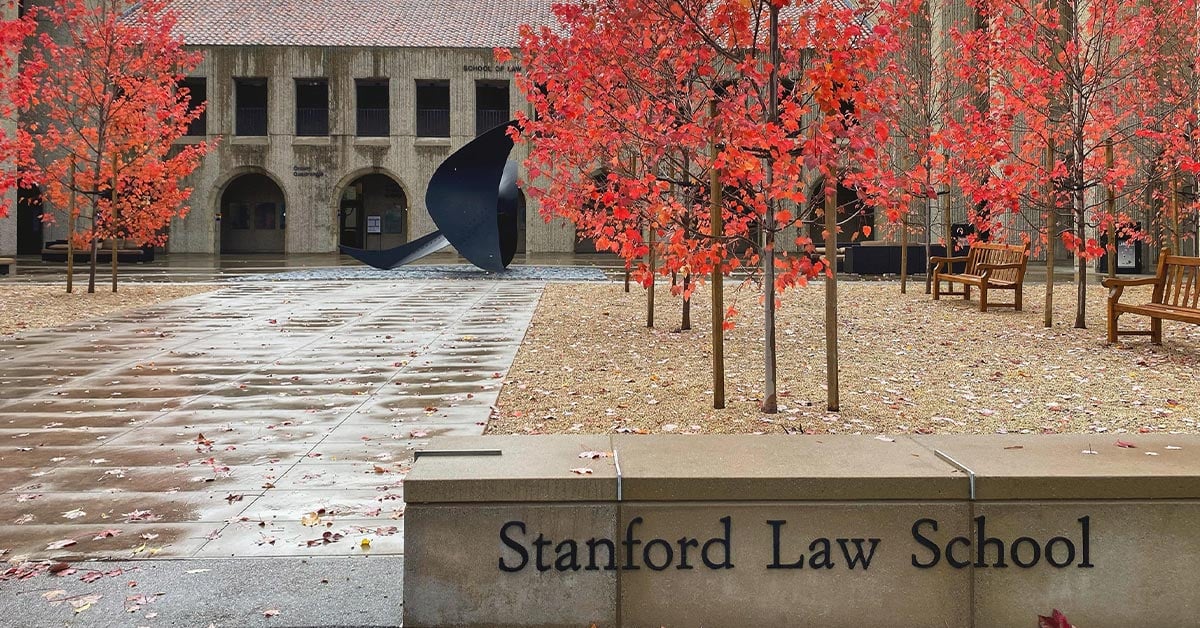
Stanford University Law School, founded in 1893, stands among the most prestigious law schools worldwide. The school offers JD, LLM, and joint-degree programs, providing an interdisciplinary and experiential approach to legal education. Stanford Law School emphasizes innovative fields such as technology and intellectual property law, positioning itself at the forefront of modern legal studies. The program produces highly regarded legal professionals and scholars globally. Stanford Law School consistently ranks in the top three law schools in the United States. The institution maintains a student-to-faculty ratio of approximately 7:1, fostering a personalized academic environment. The school’s clinical programs are notably strong, offering unique opportunities such as the Supreme Court Litigation Clinic. Joint-degree programs enable students to combine legal studies with business, public policy, and medical programs, enhancing their interdisciplinary expertise.
Stanford Law School started its law program in 1893, featuring former President Benjamin Harrison as a lecturer. The school became a leader in areas like environmental and technology law, constantly evolving with legal advancements. Stanford Law School is located on the Stanford University campus in Palo Alto, California. Being near Silicon Valley allows students to engage with technology companies and explore legal challenges surrounding innovation. The surrounding San Francisco Bay Area offers a culturally and professionally vibrant setting. Stanford University Law School remains one of the most selective law schools, with a 7.26% acceptance rate. Stanford received 4,863 applications for the 2023-2024 academic year, admitting only 353 students. The competitive nature reflects Stanford’s high academic standards. Applicants have a median LSAT score of 173 and an average GPA of 3.95, demonstrating the rigorous selection process for admission.
Stanford University Law School achieved an impressive Bar exam passage rate of 96.7% for first-time takers in 2023. The rate surpasses the California average of 75.63%, showcasing Stanford’s strong academic preparation. Stanford’s consistent success in Bar exam outcomes highlights its position as a top law school. The curriculum thoroughly prepares students for challenging exams and legal careers. Stanford University Law School offers an interdisciplinary LLM program with flexible specialization options. Areas of focus include Corporate Governance, Environmental Law and Policy, Law, Science and Technology, and International Economic Law. The program is designed to meet the needs of U.S. and international students. LLM students customize their curriculum to align with specific career aspirations and legal expertise.
Stanford University Law School’s tuition for the 2024 academic year is $73,713, with total costs exceeding $100,000. Living expenses, books, and other fees contribute to the overall cost of attendance. The percentage of students receiving financial aid is approximately 58.61%, including grants and scholarships averaging $34,199. Stanford’s financial aid program aims to ease the burden of tuition for many students pursuing legal education.
8. Yale University Law School
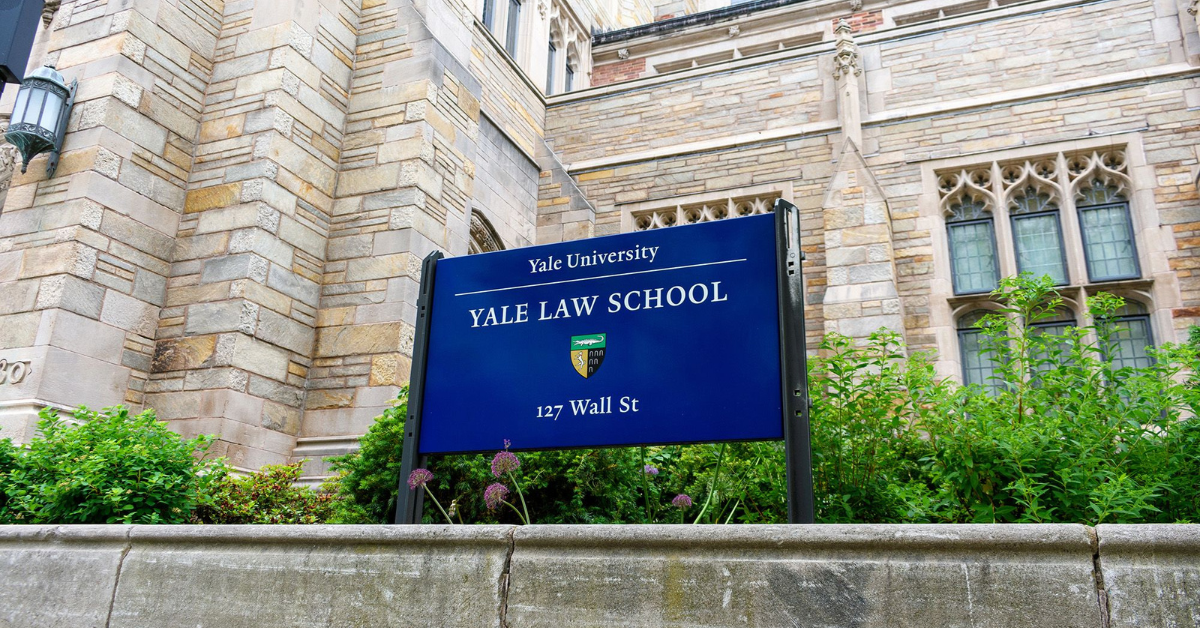
Yale University Law School, founded in 1824, is one of the most prestigious and selective law schools globally. The school is known for producing leaders in law, government, and academia located in New Haven, Connecticut. Yale Law emphasizes interdisciplinary studies and experiential learning, establishing itself as a global center of legal scholarship. The law school’s innovative approach to legal education continues to shape future legal professionals. Yale Law consistently ranks as the top law school in the United States, known for academic rigor and small class sizes. The school has a 5:1 student-to-faculty ratio, offering an intimate learning environment. Emphasizing public service and public law, many graduates pursue careers in government, nonprofits, and academia. Yale Law’s unique grading system, featuring “Credit/No Credit” for first-year students, promotes collaborative learning and intellectual exploration, fostering a supportive academic atmosphere.
Yale Law School began in the early 19th century as a small law school in New Haven, officially affiliated with Yale University in the mid-1800s. The school became a leader in legal education by the 20th century, pioneering legal realism, which emphasized the real-world effects of legal rules. The law school’s campus is located in downtown New Haven within the Sterling Law Building, known for its English Inns of Court architectural style, offering students a vibrant academic and cultural environment. Yale University Law School has an acceptance rate of 5.6%, making it one of the most selective law schools globally. The applicant pool totaled 4,471, with only 246 students admitted in the most recent cycle. The school maintains high academic standards, with a median LSAT score of 175 and a median GPA of 3.96. Yale Law’s competitive admissions process attracts top candidates from around the world, reinforcing its elite status.
Yale University Law School consistently excels in Bar exam performance, with a 2023 first-time passage rate of 96.8%. The figure is significantly higher than the national average of 77%, reflecting Yale Law’s education quality. Graduates benefit from rigorous academic preparation and extensive support, ensuring their success in legal practice. The high Bar exam passage rate underscores the school’s strong emphasis on preparing students for the legal profession. Yale University Law School offers a highly selective LLM program, admitting approximately 25 students each year. The program provides flexibility in course selection, allowing students to specialize in areas such as International Law, Human Rights, and Corporate Law. The LLM focuses on academic research and scholarship, preparing students for academic careers. Yale Law’s LLM program is designed for individuals pursuing advanced legal studies and contributions to legal scholarship.
Tuition at Yale University Law School for the 2023-2024 academic year is $76,369. The total cost of attendance is estimated at $101,000 annually, including living expenses, books, and personal costs. The school’s tuition reflects the high cost of legal education at a top-tier institution. The expense is offset for many students through financial aid, grants, or scholarships, making Yale Law accessible to qualified individuals from diverse financial backgrounds.
9. University Of California Berkeley Law
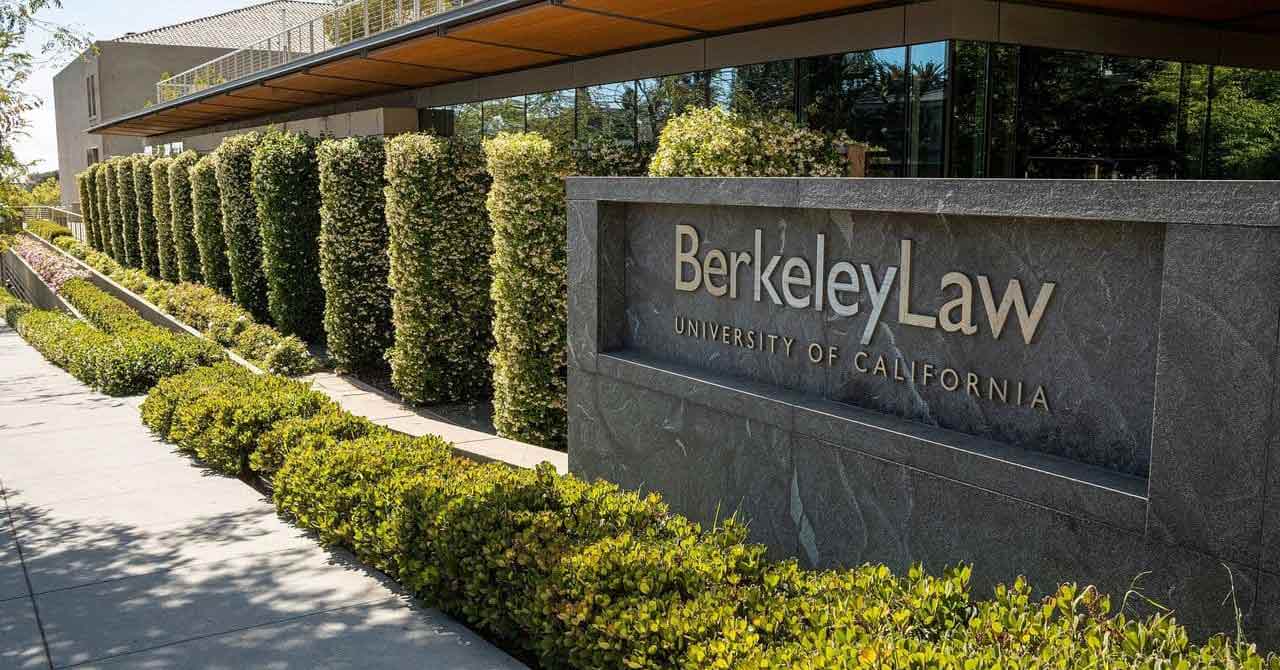
The University of California, Berkeley School of Law, founded in 1894, is one of the top law schools in the United States. Berkeley Law emphasizes social justice, innovation, and interdisciplinary legal studies and is known for its rigorous academic programs. The school is situated in the San Francisco Bay Area, offering a unique environment shaped by its proximity to Silicon Valley and the Pacific Rim. The location creates a strong foundation for diverse legal careers, fostering innovation and global perspectives in law. Berkeley Law offers JD, LLM, and JSD programs, which are recognized for their academic excellence and real-world legal practice. The school is known for its strengths in public interest law, environmental law, and law and technology. Students benefit from cutting-edge clinics and research centers, engaging in intellectual property, tech law, and corporate law. Berkeley Law graduates are highly sought after by top law firms, government roles, and public interest organizations, ensuring strong career outcomes.
Berkeley Law, originally established as the Department of Jurisprudence in 1894, became a formal law school by 1912. The school was renamed Berkeley Law in 1951 and has since become a leading institution in legal education, emphasizing social justice and progressive legal thought. The law school sits on the University of California, Berkeley’s main campus in the San Francisco Bay Area. The prime location provides access to a dynamic legal market, offering opportunities in nearby Silicon Valley and San Francisco. The University of California, Berkeley School of Law has an acceptance rate of 14.92%, making admissions competitive. The most recent admissions cycle saw close to 8,000 students apply, with 1,086 students accepted. The relatively accessible acceptance rate compared to other top-tier law schools still reflects the high academic standards Berkeley Law maintains. Successful applicants demonstrate strong academic credentials and a commitment to legal education and practice.
The University of California, Berkeley School of Law’s graduates achieved an 88.24% first-time Bar passage rate in 2023. The rate significantly exceeds the California state average of 76%, demonstrating the effectiveness of Berkeley Law’s academic preparation. The strong Bar exam performance reflects the school’s commitment to equipping students with the necessary knowledge and skills. Berkeley Law consistently produces graduates who excel in legal practice and Bar exam success. The University of California, Berkeley School of Law offers a flexible LLM program with specializations in Business Law, Intellectual Property, Environmental Law, and International Law. The program provides a comprehensive and tailored learning experience for students pursuing academic careers or practical legal expertise. Berkeley Law’s LLM program attracts students from around the world who seek advanced knowledge in their chosen legal field.
Tuition at the University of California, Berkeley School of Law for the 2023-2024 academic year is $62,567 for California residents. Non-residents face tuition fees of $74,995, with total annual costs exceeding $100,000, including living expenses. The high cost of attending Berkeley Law reflects the investment required for a top-tier legal education. Financial aid and scholarship opportunities are available to help students manage the financial burden of attending the school.
10. University Of Pennsylvania Penn Carey Law
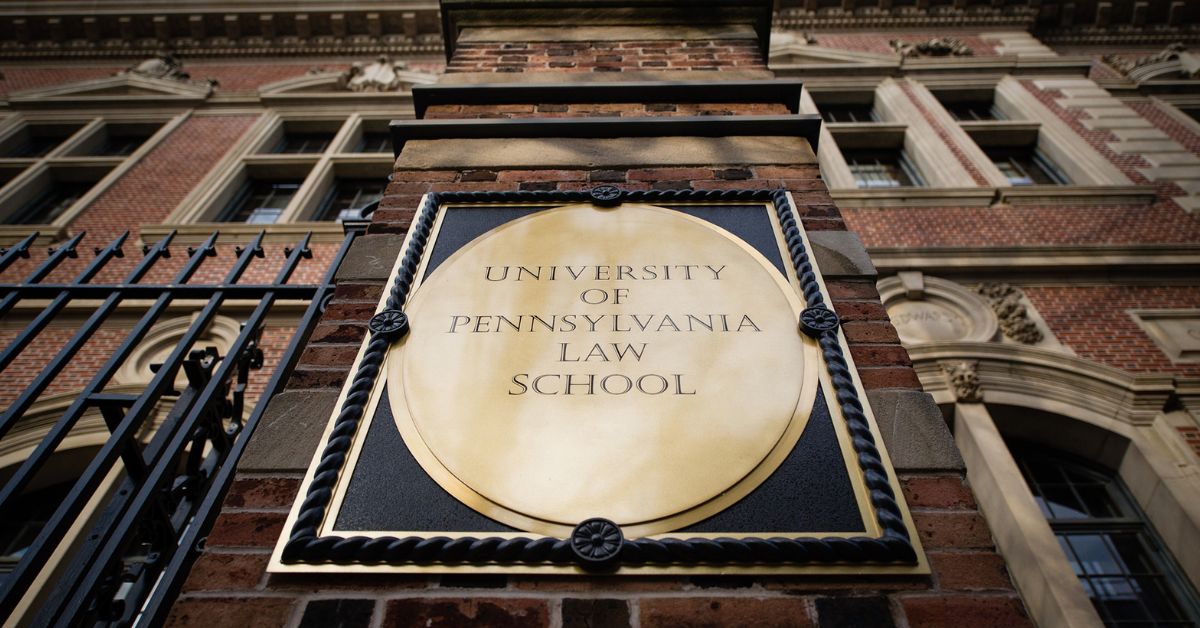
The University of Pennsylvania Carey Law School, commonly known as Penn Carey Law, is one of the top law schools in the United States. The school offers JD, LLM, and SJD programs with a focus on interdisciplinary studies and professional excellence. Penn Carey Law is well-known for integrating its programs with other prestigious Penn schools, such as the Wharton School of Business, providing students with a comprehensive legal education. Penn Carey Law consistently ranks among the best law schools in the U.S., offering a 4.9:1 student-to-faculty ratio. The school boasts strong employment outcomes, with 99% of graduates securing jobs within ten months. Several graduates work in top law firms, earning a median starting salary of $180,000. The law school’s emphasis on cross-disciplinary learning includes over 30 joint-degree programs, such as JD/MBA programs with Wharton, ensuring students receive a well-rounded education.
Penn Carey Law has a rich history of inclusion and academic excellence, established in 1850. The school was one of the first to admit women and African-American students, and its law journal is the oldest in the country. Penn Carey Law, situated on the University of Pennsylvania’s historic campus in Philadelphia, Pennsylvania, offers students access to a vibrant legal community. The campus has modern facilities, fostering an ideal legal education and professional growth environment. The University of Pennsylvania Carey Law School has an acceptance rate of 9.88%, reflecting its competitive admissions process. Applicants generally present high academic credentials, including a median LSAT score of 172 and a GPA of 3.92. The school’s selective nature ensures that admitted students demonstrate strong academic ability and a commitment to legal excellence. Penn Carey Law remains one of the country’s most prestigious and sought-after law schools.
The University of Pennsylvania Carey Law School’s graduates achieved a first-time Bar exam passage rate of 96.3% in 2023. The high passage rate significantly exceeds the national average, underscoring the strong academic preparation Penn Carey Law provides. The law school’s curriculum and support system equip students with the skills needed for success in legal practice. Graduates consistently perform well in Bar exams, reflecting the quality of their legal education. The University of Pennsylvania Carey Law School offers a well-regarded LLM program specializing in Intellectual Property, Technology Law, Global Security, Sustainability, and Human Rights. The program is designed to cater to international students and provides opportunities for cross-disciplinary learning. Penn Carey Law’s focus on academic rigor and real-world application ensures that LLM students receive a comprehensive and globally relevant legal education. The program attracts students pursuing advanced legal expertise.
The tuition at the University of Pennsylvania Carey Law School for the 2024-2025 academic year is $76,934. The total cost of attendance exceeds $100,000 annually, including living expenses, such as room and board. Several students receive grants or scholarships, with approximately 53% benefiting from financial aid. The average grant amount is $40,000, helping students manage the financial burden of attending a top-tier law school.
How To Choose A Law School For LLM Degree?
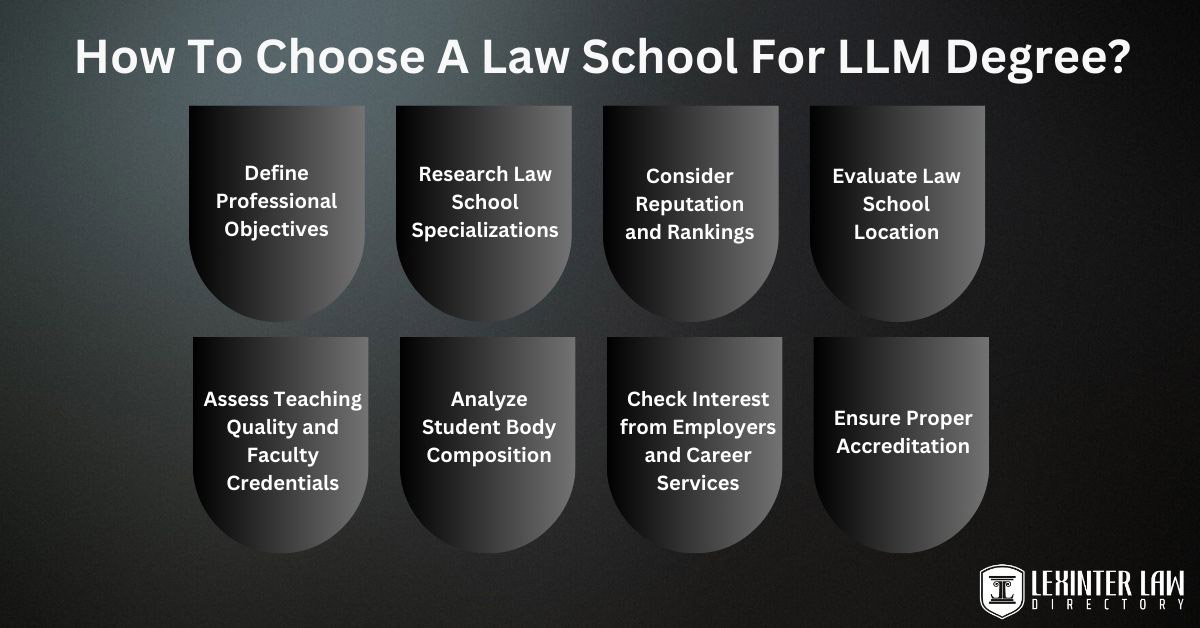
To choose a law school for LLM degree, follow the 8 steps listed below.
- Define Professional Objectives. Determine specific goals to achieve with the LLM degree, focusing on specialization, career advancement, or academic research. Clear objectives help align the program with future aspirations. Establishing a defined purpose is essential for selecting a law school that supports long-term career growth and educational needs. A clear focus on objectives guides the decision-making process.
- Research Law School Specializations. Identify law schools offering specializations that align with professional interests, such as International Law or Intellectual Property Law. Ensure faculty expertise, relevant courses, and research centers support the chosen specialization. Comprehensive research on law school specialization ensures alignment with career aspirations and provides essential resources for success in the legal field.
- Consider Reputation and Rankings. Law school reputation significantly influences employer interest and career opportunities. Schools ranked high in specific legal areas provide better job prospects. Selecting an institution with a strong reputation for an LLM degree enhances employability and networking potential. Reputation remains a key factor when evaluating law schools for career advancement and professional recognition.
- Evaluate Law School Location. Location impacts legal career prospects based on proximity to industry hubs and relevant institutions. Schools in cities like Washington D.C. for Constitutional Law or New York for Corporate Law offer distinct advantages. Choosing a law school situated near legal firms and organizations relevant to the chosen specialization optimizes career opportunities and professional development.
- Assess Teaching Quality and Faculty Credentials. Investigate faculty credentials, including publications and contributions to the legal profession. Schools with experienced scholars and legal practitioners offer higher-quality instruction and valuable networking opportunities. Evaluating teaching quality ensures the program delivers advanced knowledge and practical skills essential for future career success in specialized legal fields.
- Analyze Student Body Composition. Select a law school with a diverse student population, including international professionals and individuals from different legal backgrounds. Diversity in the classroom fosters multiple perspectives and enhances the learning environment. Engaging with peers from varied experiences broadens professional networks and provides valuable insights into global legal practices and issues.
- Check Interest from Employers and Career Services. Investigate how attractive graduates from a law school are to employers in law firms, multinational corporations, or government agencies. Schools with strong industry connections offer better job placements and career services. Ensuring that employer interest and career support are robust is essential for securing professional opportunities post-graduation.
- Ensure Proper Accreditation. Confirm that the law school is accredited by the relevant legal education authorities to guarantee the validity of the degree. Accreditation ensures the LLM program meets educational standards and is recognized by employers and legal institutions. Proper accreditation protects the value of the LLM degree and ensures global acceptance by legal professionals.
Why Do People Get An LLM Degree?
People get an LLM degree to expand their knowledge, study a specialized area of law, and gain international qualifications if they have earned a law degree outside the U.S. or Canada. An LLM, or Master of Laws, is a graduate qualification in the field of law. LLM degrees allow legal professionals to distinguish themselves in a competitive market, providing advanced expertise that leads to higher career opportunities. International lawyers seek an LLM to become familiar with the legal system of another country, which helps them meet the requirements to practice in that jurisdiction. LLM programs offer opportunities for professional networking, allowing students to connect with legal experts and peers. Several U.S. states allow foreign lawyers with an LLM to sit for the Bar exam, expanding career prospects significantly.
The benefits of earning an LLM degree include specialization, networking, and career advancement. LLM programs provide focused legal education, helping professionals master areas like intellectual property or corporate law. Employers value candidates with advanced legal knowledge, which leads to better roles in law firms, corporations, or government agencies. LLM degrees enhance networking, allowing graduates to build relationships with professors, industry experts, and peers, leading to job prospects and collaborations. LLM graduates see increased earning potential, especially in high-demand legal fields, offering a strong return on investment for professionals.
Is An LLM Degree Better Than A JD Degree?
Yes, an LLM degree is better than a JD degree. The LLM degree holds particular value for legal professionals seeking advanced or specialized knowledge in areas such as intellectual property, international law, or tax law. An LLM allows you to specialize in your specific area of interest and distinguish yourself in the legal market. The degree serves as an advantageous pathway for foreign-trained lawyers who wish to meet U.S. Bar exam eligibility requirements, allowing them to practice in various states. Lawyers aiming to practice in multiple jurisdictions or shift their legal focus benefit from the LLM degree. The advanced program provides a targeted, high-level education that goes beyond the foundational knowledge offered by the JD.
LLM programs offer unique benefits, especially for international lawyers aiming to expand their expertise in U.S. law or work in global legal contexts. An LLM degree better than JD degree for professionals seeking to specialize in niche legal areas, such as cross-border transactions or multinational corporate law. The advanced qualification offers more targeted expertise for individuals focusing on specific legal fields. The JD provides broad training, preparing individuals for general legal practice in the U.S., while the LLM is tailored for specialization. The LLM is ideal for professionals looking to advance their careers or enhance their international credentials. The JD remains the foundational degree necessary for practicing law in the United States and is not overlooked. The degree provides a comprehensive legal education, preparing students to sit for the Bar exam and practice law across various disciplines. The JD is indispensable for individuals intending to enter general legal practice within the U.S. Law students lacking a JD degree fail to meet the basic requirements for practicing law in most U.S. states, reinforcing its crucial role in the American legal landscape. The degrees serve important yet distinct roles in legal education and practice.
What Are The Best LLM Specializations?
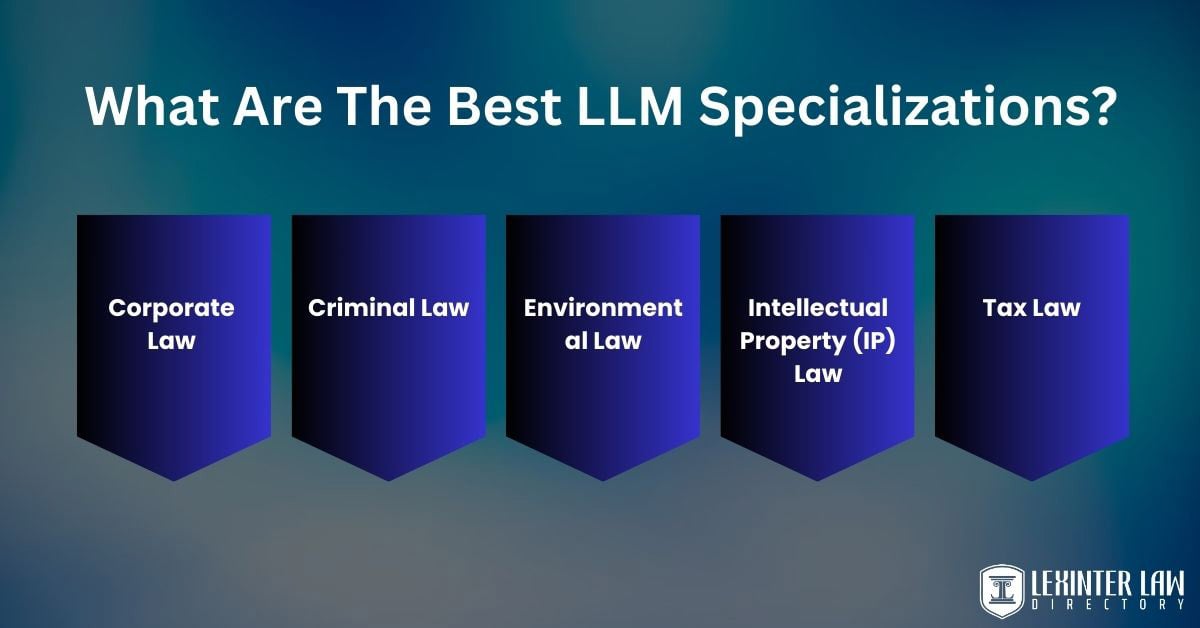
The 5 best LLM specializations are listed below.
- Corporate Law: Corporate Law LL.M. programs focus on legal aspects of business transactions, mergers, acquisitions, and corporate governance. Programs equip students with skills necessary for navigating complex corporate legal frameworks and international financial structures. Leading schools like New York University School of Law and Columbia University offer programs that provide valuable experiential learning through clinics and externships. The programs, combined with comprehensive coursework, prepare students for corporate legal roles in global markets and regulatory environments.
- Criminal Law: Criminal Law LL.M. programs prepare students for careers in criminal justice, including prosecution, defense, and policymaking. Programs focus on criminal procedures, forensic sciences, and human rights. Harvard University and the University of Chicago offer robust programs that equip students for criminal litigation, reform, and international criminal law roles, providing a thorough understanding of legal processes in domestic and global criminal justice contexts.
- Environmental Law: Environmental Law LL.M. programs address legal issues related to environmental protection, natural resources, and climate change policies. Programs prepare lawyers to tackle global concerns, such as pollution and sustainable development. University of California, Berkeley, and Stanford University offer leading programs allowing students to work with governments, NGOs, and corporations on environmental compliance, litigation, and sustainability efforts, emphasizing practical solutions for environmental challenges.
- Intellectual Property (IP) Law: Intellectual Property Law LL.M. programs specialize in protecting intellectual property, including patents, trademarks, and copyrights. Programs are crucial as digital content and technology rapidly evolve, creating new legal challenges. Duke University School of Law and University of Pennsylvania Penn Carey Law provide leading programs that train lawyers to advise clients in technology, media, and entertainment, focusing on innovation protection and intellectual property rights.
- Tax Law: Tax Law LL.M. programs focus on national and international taxation, covering corporate tax, estate planning, and compliance strategies. Programs are essential for lawyers advising businesses and individuals on tax regulations. New York University School of Law and University of Virginia offer top programs that prepare students to work with corporations, government agencies, and private clients on complex taxation systems, emphasizing expertise in global tax compliance and planning strategies.
How Challenging Is Completing An LLM Degree?
Completing an LLM degree is highly challenging due to the academic rigor and specialized nature of the program. The coursework requires students to engage in extensive reading, analyze complex case studies, and master sophisticated legal theories. Independent research is central to the LLM, with a focus on developing advanced analytical and critical thinking skills. The final dissertation or thesis demands in-depth research on a specialized legal topic, further adding to the academic pressure. Students must demonstrate excellent time management skills to meet strict deadlines. The intense workload, especially for individuals balancing work and studies, makes procrastination a major obstacle. Foreign students face additional challenges in mastering legal content and language skills.
The LLM program, usually completed in one year for full-time students, extends to two years for part-time participants. Good law colleges offer flexibility by providing part-time options, allowing students to balance their academic pursuits with professional commitments. Managing coursework deadlines alongside independent research becomes a key challenge for many students. The program’s difficulty is considerable, but the benefits include enhanced career prospects, specialized legal expertise, and networking opportunities. Several students pursue an LLM to meet specific Bar requirements in jurisdictions like the United States, which adds further complexity to the already demanding coursework.
How Much Does Master Of Laws Cost?
Master of Laws (LL.M.) costs between $50,000 and $80,000 for tuition in the United States. Factoring in additional expenses such as housing, health insurance, books, and personal costs, the total cost rises significantly higher. Harvard Law School’s LL.M. program for the 2024-2025 academic year costs $78,692 in tuition, but the overall cost, including living expenses, reaches approximately $113,692. Columbia Law School estimates a similar total, with tuition at $81,292 and an overall cost of $113,711 for the year. NYU Law’s program has a tuition of $80,014, with a total annual cost of around $109,458 when factoring in living expenses.
Several factors impact the overall Master of Laws cost, including location, residency status, living expenses, and health insurance fees. Location plays a key role, as schools in high-cost cities like New York tend to have higher living expenses. Residency status influences costs at public universities, where in-state residents enjoy lower tuition rates. Living expenses such as housing, food, and transportation vary depending on the city. Health insurance fees, which are mandatory, add to the total expenses. The program length affects the overall cost, with some part-time or extended programs leading to additional financial burdens.
How Can Lexinter Help You Find A Nearby Attorney?
Lexinter can help you find a nearby attorney by offering an intuitive search feature that filters attorneys based on city, state, region, and area of practice. The platform provides potential clients with detailed attorney profiles that include contact information, credentials, office hours, and a direct link to the attorney’s Google My Business profile. People searching for “find nearby attorney” use Lexinter to schedule consultations through the platform, either over the phone or in person. Lexinter ensures clients connect with reputable lawyers specializing in their specific legal needs, whether related to criminal defense, family law, or business law. The directory’s premium listings enhance visibility, ensuring attorneys are easily accessible to individuals needing legal assistance.
Lexinter is an online legal directory designed to connect individuals with attorneys across various legal fields. Lexinter helps attorneys increase their online presence by listing their contact information, credentials, and business hours in a user-friendly format. The platform’s premium listings include links to the law firm’s website and social media profiles, making it easier for potential clients to find reputable legal services. Individuals looking to “find attorney near me” use Lexinter’s advanced search tool, which filters results by location, legal specialty, and availability. The feature helps users quickly find the right lawyer. Lexinter receives millions of visitors annually, demonstrating its importance as a trusted resource for legal assistance.T

